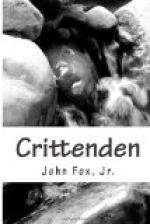Two toasts were drunk that night—one by the men who were to lead the Rough Riders of the West.
“May the war last till each man meets death, wears a wound, or wins himself better spurs.”
And, in the hold of the same ship, another in whiskey from a tin cup between two comrades:
“Bunkie,” said Blackford, to a dare-devil like himself, “welcome to the Spanish bullet that knocks for entrance here”—tapping his heart. Basil struck the cup from his hand, and Blackford swore, laughed, and put his arm around the boy.
X
Already now, the first little fight was going on, and Grafton, the last newspaper man ashore, was making for the front—with Bob close at his heels. It was hot, very hot, but the road was a good, hard path of clean sand, and now and then a breeze stirred, or a light, cool rain twinkled in the air. On each side lay marsh, swamp, pool, and tropical jungle—and, to Grafton’s Northern imagination, strange diseases lurked like monsters everywhere. Every strange, hot odour made him uneasy and, at times, he found himself turning his head and holding his breath, as he always did when he passed a pest-house in his childhood. About him were strange plants, strange flowers, strange trees, the music of strange birds, with nothing to see that was familiar except sky, mountain, running water, and sand; nothing home-like to hear but the twitter of swallows and the whistle of quail.
That path was no road for a hard-drinking man to travel and, now and then, Grafton shrank back, with a startled laugh, from the hideous things crawling across the road and rustling into the cactus—spiders with snail-houses over them; lizards with green bodies and yellow legs, and green legs and yellow bodies; hairy tarantulas, scorpions, and hideous mottled land-crabs, standing three inches from the sand, and watching him with hideous little eyes as they shuffled sidewise into the bushes. Moreover, he was following the trail of an army by the uncheerful signs in its wake—the debris of the last night’s camp—empty cans, bits of hardtack, crackers, bad odours, and, by and by, odds and ends that the soldiers discarded as the sun got warm and their packs heavy—drawers, undershirts, coats, blankets, knapsacks, an occasional gauntlet or legging, bits of fat bacon, canned meats, hardtack—and a swarm of buzzards in the path, in the trees, and wheeling in the air—and smiling Cubans picking up everything they could eat or wear.
An hour later, he met a soldier, who told him there had been a fight. Still, an hour later, rumours came thick, but so conflicting and wild that Grafton began to hope there had been no fight at all. Proof met him, then, in the road—a white man, on foot, with his arm in a bloody sling. Then, on a litter, a negro trooper with a shattered leg; then another with a bullet through his throat; and another wounded man, and another. On horseback rode a Sergeant with a bandage around his brow—Grafton could see him smiling broadly fifty yards ahead—and the furrow of a Mauser bullet across his temple, and just under his skin.




